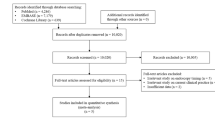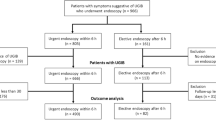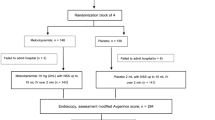Abstract
Early endoscopy has been advocated for the management of upper gastrointestinal bleeding, but the optimal timing for early endoscopy is still uncertain. The aim of this Review is to evaluate the optimal timing of early endoscopy by examining the findings of randomized clinical trials and retrospective cohort studies that used comparable outcome measures and have been reported in the literature. Outcome measurements included recurrent bleeding, surgery, mortality, length of hospital stay, and blood transfusion. Studies were categorized into those in which endoscopy was performed within 2–3 h, 6–8 h, 12 h or 24 h of the patient's presentation to hospital. We conclude that early endoscopy aids risk stratification of patients and reduces the need for hospitalization. However, it may also expose additional cases of active bleeding and hence increase the use of therapeutic endoscopy. No evidence exists that very early endoscopy (within a few hours of presentation) can reduce the risk of rebleeding or improve survival.
Key Points
-
Endoscopy within 12 h of presentation leads to increased use of endoscopic therapy for advanced stigmata of hemorrhage, which may not be necessary
-
No evidence exists for any clinical benefit of endoscopy performed within 12 h of presentation
-
Early endoscopy within 12 h of presentation does not reduce the rebleeding rate or improve survival of patients
-
Endoscopy within 24 h of presentation is recommended for management of upper gastrointestinal bleeding, because it has clinical benefits
-
Endoscopy within 24 h of hospitalization aids risk assessment and reduces the length of hospital stay
-
In health-care practices where a 24 h endoscopy service is not available, endoscopy should be offered to patients the next day
This is a preview of subscription content, access via your institution
Access options
Subscribe to this journal
Receive 12 print issues and online access
$209.00 per year
only $17.42 per issue
Buy this article
- Purchase on Springer Link
- Instant access to full article PDF
Prices may be subject to local taxes which are calculated during checkout

Similar content being viewed by others
References
Gralnek, I. M., Barkun, A. N. & Bardou, M. Management of acute bleeding from a peptic ulcer. N. Engl. J. Med. 359, 928–937 (2008).
Barkun, A. et al. The Canadian Registry on Nonvariceal Upper Gastrointestinal Bleeding and Endoscopy (RUGBE): endoscopic hemostasis and proton pump inhibition are associated with improved outcomes in a real-life setting. Am. J. Gastroenterol. 99, 1238–1246 (2004).
Barkun, A., Bardou, M. & Marshall, J. K. Consensus recommendations for managing patients with nonvariceal upper gastrointestinal bleeding. Ann. Intern. Med. 139, 843–857 (2003).
Adler, D. J. et al. ASGE guideline: the role of endoscopy in acute non-variceal upper GI hemorrhage. Gastrointest. Endosc. 60, 497–504 (2004).
Palmer, K. R. Non-variceal upper gastrointestinal haemorrhage: guidelines. Gut 51, 1–6 (2002).
Palmer, K. & Nairn, M. Management of acute gastrointestinal blood loss: summary of SIGN guidelines. BMJ 337, 1832 (2008).
Almela, P. et al. Outpatient management of upper digestive hemorrhage not associated with portal hypertension: a large prospective cohort. Am. J. Gastroenterol. 96, 2341–2348 (2001).
Brullet, E. et al. A randomized study of the safety of outpatient care for patients with bleeding peptic ulcer treated by endoscopic injection. Gastrointest. Endosc. 60, 15–21 (2004).
Cipolletta, L., Bianco, M. A., Rotondano, G., Marmo, R. & Piscopo, R. Outpatient management for low-risk nonvariceal upper GI bleeding: a randomized controlled trial. Gastrointest. Endosc. 55, 1–5 (2002).
Hsu, P. et al. When to discharge patients with bleeding peptic ulcers: a prospective study of residual risk of rebleeding. Gastrointest. Endosc. 44, 382–387 (1996).
Cebollero-Santamaria, F. et al. Selective outpatient management of upper gastrointestinal bleeding in the elderly. Am. J. Gastroenterol. 94, 1242–1247 (1999).
Lai, K., Hui, W. M., Wong, B. C., Ching, C. K. & Lam, S. K. A retrospective and prospective study on the safety of discharging selected patients with duodenal ulcer bleeding on the same day as endoscopy. Gastrointest. Endosc. 45, 26–30 (1997).
Longstreth, G. F. & Feitelberg, S. P. Successful outpatient management of acute upper gastrointestinal hemorrhage: use of practice guidelines in a large patient series. Gastrointest. Endosc. 47, 219–222 (1998).
Longstreth, G. F. & Feitelberg, S. P. Outpatient care of selected patients with acute non-variceal upper gastrointestinal haemorrhage. Lancet 345, 108–111 (1995).
Campo, R. et al. Safety of outpatient management of nonvariceal upper gastrointestinal bleeding: preliminary results of a randomized study [abstract 228]. Gastrointest. Endosc. 47, AB81 (1998).
Hussain, I. et al. A cost effective strategy for managing GI bleeding secondary to peptic ulcer disease [abstract]. Gastroenterology 108, A18 (1995).
Tammaro, L. et al. Endoscopic findings in patients with upper gastrointestinal bleeding clinically classified into three risk groups prior to endoscopy. World J. Gastroenterol. 14, 5046–5050 (2008).
Rockall, T. A., Logan, R. F., Devlin, H. B. & Northfield, T. C. Influencing the practice and outcome in acute upper gastrointestinal haemorrhage. Gut 41, 606–611 (1997).
Ong, T. Z., Yeoh, K. G. & Ho, K. Y. Emergency endoscopy within 4 hours is an independent predictive factor for reduced mortality in patients presenting with high-risk upper GI bleeding. Gastrointest. Endosc. 59, 162 (2004).
Koch, J., Rocky, D. C. & Cello, J. P. Emergent endoscopy in hemodynamically stable patients with upper gastrointestinal hemorrhage (UGIH) decreases hospital admission rate. Gastrointest. Endosc. 43, 315 (1996).
Choudari, C. P. & Palmer, K. R. Timing of endoscopy for severe peptic ulcer hemorrhage: Out of hours emergency endoscopy is unnecessary. Gastroenterology 104, A55 (1993).
Lindenauer, P. K., Roll, F. J., Gebretsadik, T. & Terdiman, J. P. Endoscopy improves outcome and reduces length of stay in elderly patients with acute upper gastrointestinal bleeding: results of a statewide population based analysis. Am. J. Gastroenterol. 116, A76 (1999).
Yen, D. et al. Arterial oxygen desaturation during emergent nonsedated upper gastrointestinal endoscopy in the emergency department. Am. J. Emerg. Med. 15, 644–647 (1997).
Lin, H. et al. Early or delayed endoscopy for patients with peptic ulcer bleeding: a prospective randomized study. J. Clin. Gastroenterol. 22, 267–271 (1996).
Lee, J. G. et al. Endoscopy-based triage significantly reduces hospitalization rates and costs of treating upper GI bleeding: a randomized controlled trial. Gastrointest. Endosc. 50, 755–761 (1999).
Bjorkman, D. J. et al. Urgent vs. elective endoscopy for acute non-variceal upper-GI bleeding: an effectiveness study. Gastrointest. Endosc. 60, 1–8 (2004).
Cooper, G. S., Chak, A., Connors, A. F. Jr, Harper, D. L. & Rosenthal, G. E. The effectiveness of early endoscopy for upper gastrointestinal hemorrhage: a community-based analysis. Med. Care 36, 462–474 (1998).
Cooper, G. S. et al. Early endoscopy in upper gastrointestinal hemorrhage: Associations with recurrent bleeding, surgery, and length of hospital stay. Gastrointest. Endosc. 49, 145–152 (1999).
Schacher, G. M. et al. Is early endoscopy in the emergency room beneficial in patients with bleeding peptic ulcer? A “fortuitously controlled” study. Endoscopy 37, 324–328 (2005).
Tai, C. et al. High-risk ED patients with nonvariceal upper gastrointestinal hemorrhage undergoing emergency or urgent endoscopy: A retrospective analysis. Am. J. Emerg. Med. 25, 273–278 (2007).
Targownik, L. E., Murthy, S., Keyvani, L. & Leeson, S. The role of rapid endoscopy for high-risk patients with acute nonvariceal upper gastrointestinal bleeding. Can. J. Gastroenterol. 21, 425–429 (2007).
Saeed, Z. A., Ramirez, F. C., Hepps, K. S., Cole, R. A. & Graham, D. Y. Prospective validation of the Baylor bleeding score for predicting the likelihood of rebleeding after endoscopic hemostasis of peptic ulcers. Gastrointest. Endosc. 41, 561–565 (1995).
Saeed, Z. A., Winchester, C. B., Michaletz, P. A., Woods, K. L. & Graham, D. Y. A scoring system to predict rebleeding after endoscopic therapy of nonvariceal upper gastrointestinal haemorrhage. Am. J. Gastroenterol. 88, 1842–1849 (1993).
Rockall, T. A., Logan, R. F., Devlin, H. B. & Northfield, T. C. Risk assessment after acute upper gastrointestinal haemorrhage. Gut 38, 316–321 (1996).
Spiegel, B. M., Vakil, N. B. & Ofman, J. J. Endoscopy for acute nonvariceal upper gastrointestinal tract hemorrhage: Is sooner better? Arch. Intern. Med. 161, 1393–1404 (2001).
Blatchford, O., Murray, W. R. & Blatchford, M. A risk score to predict need for treatment for upper-gastrointestinal haemorrhage. Lancet 356, 1318–1321 (2000).
Camellini, L. et al. Comparison of three different risk scoring systems in non-variceal upper gastrointestinal bleeding. Dig. Liver Dis. 36, 271–277 (2004).
Bessa, X. et al. Applicability of the Rockall score in patients undergoing endoscopic therapy for upper gastrointestinal bleeding. Dig. Liver Dis. 38, 12–17 (2006).
Das, A. & Wong, R. C. K. Prediction of outcome of acute GI hemorrhage: A review of risk scores and predictive models. Gastrointest. Endosc. 60, 85–93 (2004).
Sacks, H. S., Chalmers, T. C., Blum, A. L., Berrier, J. & Pagano, D. Endoscopic hemostasis. An effective therapy for bleeding peptic ulcers. JAMA 264, 494–499 (1990).
Cook, D. J., Guyatt, G. H., Salena, B. J. & Laine, L. A. Endoscopic therapy for acute nonvariceal upper gastrointestinal hemorrhage: A meta-analysis. Gastroenterology 102, 139–148 (1992).
Acknowledgements
K. K. F. Tsoi's work is supported by a Chief Executive's Commission Grant of the Hong Kong Special Administration Region Government.
Author information
Authors and Affiliations
Corresponding author
Ethics declarations
Competing interests
J. J. Y. Sung serves on the Advisory Board of AstraZeneca, and is a member of the speakers' bureaux for AstraZeneca, Nycomed, Roche, GlaxoSmithKline and Bristol-Myers Squibb. The other authors declare no competing interests.
Rights and permissions
About this article
Cite this article
Tsoi, K., Ma, T. & Sung, J. Endoscopy for upper gastrointestinal bleeding: how urgent is it?. Nat Rev Gastroenterol Hepatol 6, 463–469 (2009). https://doi.org/10.1038/nrgastro.2009.108
Published:
Issue Date:
DOI: https://doi.org/10.1038/nrgastro.2009.108
This article is cited by
-
Relationship between angiography timing and angiographic visualization of extravasation in patients with acute non-variceal gastrointestinal bleeding
BMC Gastroenterology (2020)
-
Severity and Outcomes of Upper Gastrointestinal Bleeding With Bloody Vs. Coffee-Grounds Hematemesis
American Journal of Gastroenterology (2018)
-
Non-variceal upper gastrointestinal bleeding
Nature Reviews Disease Primers (2018)
-
Successful Endoscopic Hemostasis Is a Protective Factor for Rebleeding and Mortality in Patients with Nonvariceal Upper Gastrointestinal Bleeding
Digestive Diseases and Sciences (2016)



